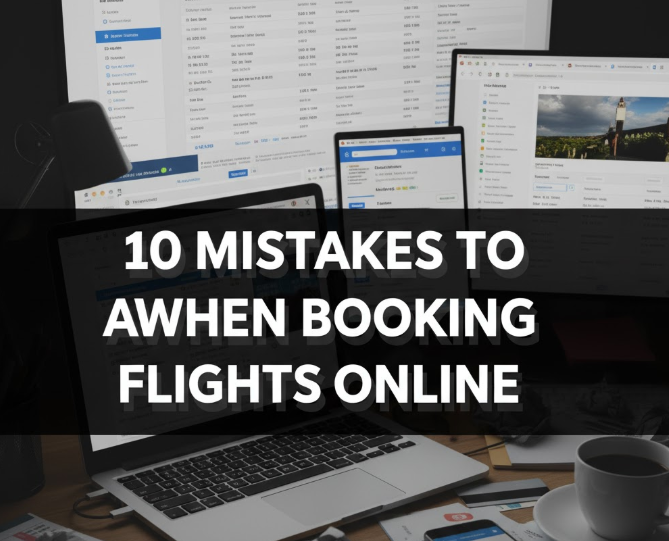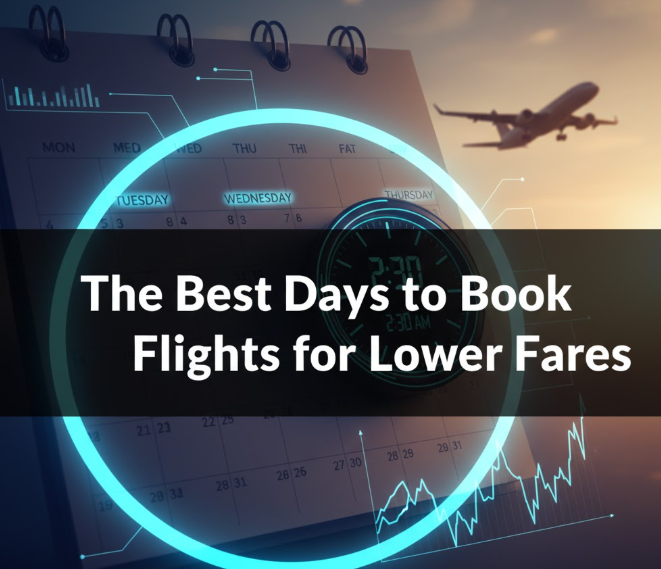Flying a plane, it should be easy to purchase flights online, right? Well, not always. Amid hundreds of sites and dozens of flight options, with complex pricing structures, that doesn’t have to be hard. Whether you are planning a vacation, business trip or family visit, one misstep can cost you hundreds of dollars or turn your travel dreams into a nightmare.
The good news? The majority of these errors are 100% preventable once you learn what to be aware of. In this guide, we’re going to break down the ten most common mistakes that travelers make when booking flights and teach you how to avoid them. By the time you’ve finished reading, you’ll be able to book flights like a pro: sparing your wallet and your stress levels.
Mistake #1: Not Checking Multiple Sites When Booking
The Problem: Most travelers use only one booking website, thinking all prices are the same. Nothing could be further from the truth.
Different booking platforms have differing deals, alliances with airlines and formulations of pricing. The exact same flight may range in price from $50 to $300, depending on where you book it. Some websites tack on hidden charges, while others provide exclusive discounts.
Smart Strategy
And always look at a minimum of three to four different websites before making your final decision. Common choices are Google Flights, Skyscanner, Kayak and the company’s own home page. Every one has its own strengths — Google Flights is very good at displaying flexible dates, while Skyscanner often produces the most economical combinations.
Pro Tip: Once you find a good price on a comparison site, look the airline up directly. In some cases booking directly with the airline can save you money and provide better customer service if things go sideways.
Mistake #2: Overlooking the Fine Print on Baggage Policies
That $99 flight to Miami seems like a great deal until you see that it doesn’t include a single piece of checked luggage, seat selection or even one carry-on bag. Budget airlines are famous for touting unbelievably cheap base fares, then coming at you with countless add-on fees.
| Airline Type | Base Fare Includes | Extra Fees Add Up For |
|---|---|---|
| Traditional Airlines | 1 personal item, 1 carry-on, 1 checked bag | Additional bags, overweight bags |
| Budget Airlines | 1 small personal item only | Carry-ons, checked bags, seat assignments, drinks |
| Premium Airlines | 2 checked bags, meals and drinks and seat assignments | Excess baggage charges/amendments |
Before clicking “purchase,” be sure to read exactly what is included in your ticket. If you have to check a bag, add the cost of that, to determine your total price. Sometimes a slightly more expensive fare that includes bags turns out to be less expensive in the long run.
For more tips on finding the best flight deals, visit Call to Flights.
Mistake #3: Being Inflexible with Travel Dates
Choosing a date and not considering dates nearby can be very costly. Flight prices can fluctuate wildly — sometimes by hundreds of dollars — simply because you depart a day earlier or later, or return on the Sunday instead of the Saturday before work on Monday.
Average Difference in Price for Each Day of the Week
| Day | Average Price |
|---|---|
| Monday | $385 |
| Tuesday | $349 |
| Wednesday | $360 |
| Thursday | $450 |
| Friday | $600 |
| Saturday | $420 |
| Sunday | $540 |
Tuesdays and Wednesdays are often the best days to fly (fewer people do, and some airlines charge less for those tickets) while Fridays and Sundays are the most expensive. On booking sites, use the flexible date search tools to see a calendar view of prices.
Mistake #4: Leaving It Too Late to Book
There is widespread myth that at the last minute, airlines slash prices to sell any empty seats. It does happen sometimes, but it’s far from the norm. In practice, waiting too long generally means ponying up to pay the premium.
For domestic flights, the “sweet spot” for booking is around 6-8 weeks before departure. And for international travel, it’s best to book 2-3 months ahead. During high travel times (summer, holidays), even be more ahead sometimes 3-4 months.
Caution: Last minute reservations (in the two weeks prior to departure) could be 2-3 times more expensive than advance rates. Airlines can charge what they want, desperate travelers will pay.

Mistake #5: Failing to Verify Passport and Visa Requirements
Picture booking the trip of your dreams to Thailand, only to learn at the airport that your passport expires in four months — and Thailand requires six months. That day, you aren’t flying anywhere.
It is a mistake that occurs more frequently than you might imagine. The entry requirements vary by country, and they change frequently. Some require visas that can take weeks to process. Some demand proof of onward travel, or specific inoculations.
What to Check Before Booking
- Passport Expiration Date: Most countries require that your passport has at least 6 months of validity on it after you depart.
- Visa requirements: Some issue visa on arrival, others by application.
- Transit visas: If you have a layover in some countries, you may require a transit visa.
- Vaccination requirements: Some locations require you to show proof of particular vaccinations.
- COVID-19 regulations: They remain in effect throughout the world; they also change constantly.
You can check current visa requirements at the U.S. Department of State Travel Information website.
Mistake #6: Failing to Set Up Price Alerts and Monitor Fluctuations
Like hotel rates, flight prices can vary widely — sometimes even several times a day. If you find a price you can live with, but aren’t ready to pull the trigger that second, don’t just think it’ll still be there when you’re ready. Set up price alerts.
Many booking platforms and apps, including Hopper, Google Flights and Skyscanner will let you track individual routes. They’ll email you or let you know when prices drop. Some even make predictions about whether prices will increase or drop and suggest the best time to purchase.
Also, airlines sometimes have flash sales or error fares (prices mistakenly uploaded to the system at a fraction of what they should be). If you follow airlines on social media or subscribe to deal newsletters, you could also stumble upon these opportunities.
Mistake #7: Not Allowing Enough Time Between Connecting Flights
The Payoff: $100 in savings on a flight with a 45-minute layover. Your original flight is 30 minutes late. You miss your connection and you’ve got to pony up $300 to rebook. Sound familiar?
The seemingly appealing prospect of a short layover exists because it can get you to your destination quicker and, frequently, for less. But they’re risky. You could miss your connection if the first flight is late. If your luggage has to be transferred, tight connections raise the likelihood it won’t.
| Connection Type | Minimum Recommended Time | Why |
|---|---|---|
| Same Airport, Domestic | 60-90 minutes | Time to deplane, walk, security (if changing terminals) |
| Same Airport, International | 2-3 hours | Customs, immigration and potential terminal changes |
| Different Airports | 3-4 hours | Ground transportation transfer + check-in + clear security |
| Large Hub Airports | 90-120 minutes | Long walks between flights and crowded security queues |
Mistake #8: Failing to Read Cancellation and Change Policies
Life is unpredictable. Emergencies happen. Plans change. But if you failed to review the cancellation policy before booking and / or fail to cancel within the allowed window, you could lose the cost of your entire ticket — or face hefty fees for any changes.
Some airlines now have multiple fare types for the same flight: Basic Economy (the cheapest but with the most restrictions), Main Cabin (the basic option, with some flexibility) and Premium (the most flexible, with more ease in making changes). That supersaver Basic Economy ticket typically means no changes at all and no refunds.
Questions to Ask Before Booking
- Can I cancel this ticket? Will I receive a refund or do I only get travel credit?
- What are the flight date change fees?
- Is there a 24-hour period in which I can cancel at no charge?
- What if the airline cancels or substantially delays my flight?
Good news: by law (in the US), most airlines must give a 24-hour cancellation policy. When you book directly with the airline, you often can cancel for a full refund if it is within 24 hours.
Mistake #9: Overlooking Travel Insurance
Travel insurance can seem like a waste of money — until you need it. Medical emergencies, natural disasters, family crises, or a sudden work-related cancellation can strike any traveller. Without insurance, you might be out thousands of dollars.
But not all travel insurance is created equal. The insurance sold within the booking process is often more costly and less inclusive than stand-alone policies that you can buy independently.
What Good Travel Insurance Is Worth Covering
- Trip cancellation: Payback if you can’t travel for covered reasons
- Trip interruption: This is coverage if you have to end your trip early
- Emergency medical: Health and travel insurance while overseas
- Medical evacuation: Transportation to available medical facilities
- Lost or delayed luggage: Compensation for lost, stolen or delayed baggage
- Travel delays: Compensation for lengthy delays
Compare policies from the likes of World Nomads, Allianz or Travel Guard. Read reviews, and know what is included vs. not included.
Mistake #10: Booking on Unsecured Public Wi-Fi
You know the scene: You’re at a coffee shop, read about an irresistible flight deal and book it — slapdash layout be damned. What you may not realize is that public networks are gold mines for hackers. The credit card details, passport information and personal data could be captured.
Public Wi-Fi is a tool through which hackers can get hold of your sensitive data in multiple ways. When you’re typing in payment information, passport numbers and all the personal details required during flight booking, you are giving a criminal everything they need to steal your identity or defraud you financially.
How to Stay Safe
- Use the data on your phone: Turn off Wi-Fi, use your cellular connection
- Get a VPN: Virtual Private Networks encrypt your web traffic
- Wait until you’re home: Whenever possible, make your important travel reservations from a secure home network
- Look for HTTPS: Ensure the site URL begins with “https” (the “s” stands for secure)
- Swipe credit, not debit: Credit cards offer stronger fraud protection than debit
Final Thoughts: How to Book a Smarter Flight
Booking a flight online does not need to be difficult or costly. By sticking to these 10 common sense principles, you will save money, avoid travel anxiety and set yourself up for smoother journeys. Be sure to compare prices across sites, carefully read the fine print, remain flexible with your dates, and safeguard your personal information.
It’s all about preparation and patience. Don’t rush the process. Do your homework, compare choices and work through as many potential problems before they become reality. That extra hour of research might save you a hundred bucks and ten headaches later.
Travel is meant to be fun, not stressful. With these tips in your arsenal, you can book your next flight knowing that it’s a decision both informed and savvy. Safe travels!
For more expert travel advice and flight booking tips, check out Call to Flights.

Frequently Asked Questions
Q: What day of the week is cheapest to book flights?
A: Tuesday and Wednesday are usually the least expensive days to book flights. Airlines’ sales are frequently posted Monday evenings, and by Tuesday afternoon other carriers have matched the fares. But what day you fly on makes a difference in the cost even more than the day you book—Tuesdays and Wednesdays are usually the least expensive days to fly.
Q: Which is cheaper, one-way or round-trip flights?
A: It depends. Round-trip tickets used to be cheaper, but in the era of budget carriers and dynamic pricing that’s not always the case. Always compare both options. Also, if it saves you money, consider buying each direction from different airlines.
Q: Should I be using incognito mode to buy flight tickets at a cheaper rate?
A: This is mostly a myth. Airlines and booking sites use cookies to keep track of your searches, with the general but not universal goal of having you book soon — that is, before you continue clicking or tapping elsewhere on the internet. Either way, there’s no harm in using incognito mode and it might help you view prices without any personalization or cached data affecting what you see.
Q: How early should I book international flights?
A: For flights abroad, that sweet spot is four months and 22 days in advance. But it would be fine to book with 3-4 months in advance, on a peak season or popular destinations. For less popular routes or off-peak travel, you might score a deal closer to departure.
Q: What if I miss my connecting flight?
A: If you made one booking that included both flights on a single ticket, and if the arrival delay caused you to miss the connection, then the airline should rebook you at no cost. But if you booked tickets separately or missed the connecting flight for reasons under your control, you will likely have to purchase a new ticket, or pay change fees.
Q: Can I trust third-party booking sites?
A: The vast majority of third-party sites (Expedia, Kayak, Priceline) are reputable for booking. But if you have to make changes or lodge a complaint with them, the process can be more complex than booking directly with airlines. The airline can refer you back to the booking site for service problems. Balance the possible savings against the convenience of booking direct.
Q: Do I get a refund if prices drop after I book?
A: That depends on the airline and type of fare. Several carriers let you cancel within 24 hours and rebook at the lower price. A small number of airlines will issue the difference in a refund if prices fall. Check your airline’s specific policy. Airfare is also eligible for price protection with some credit cards.






